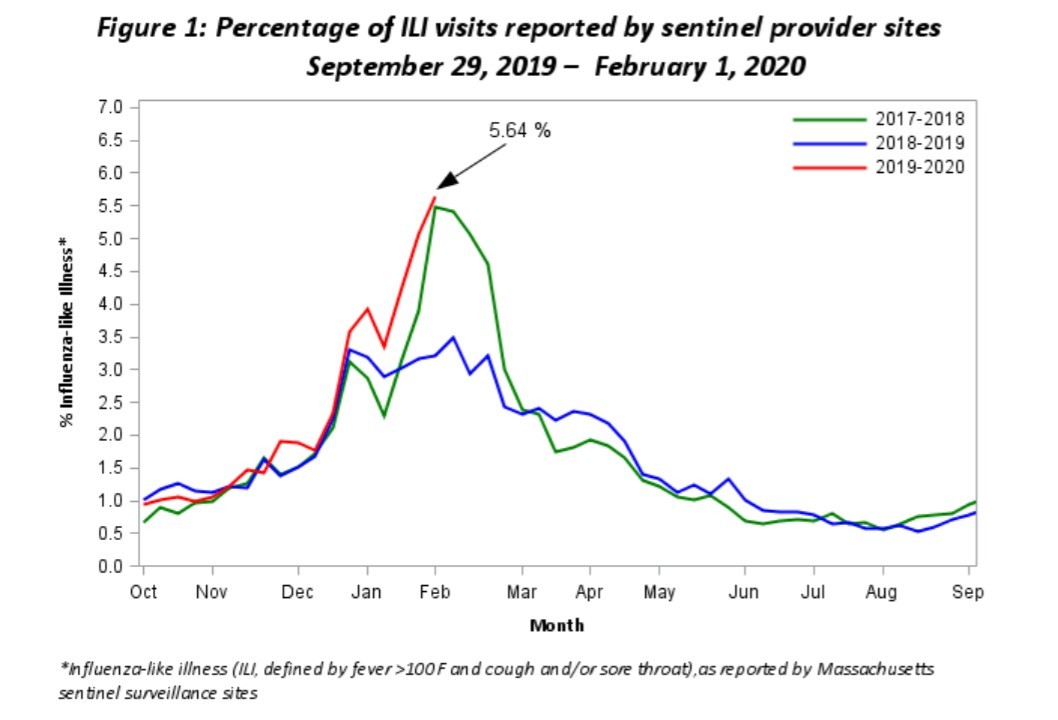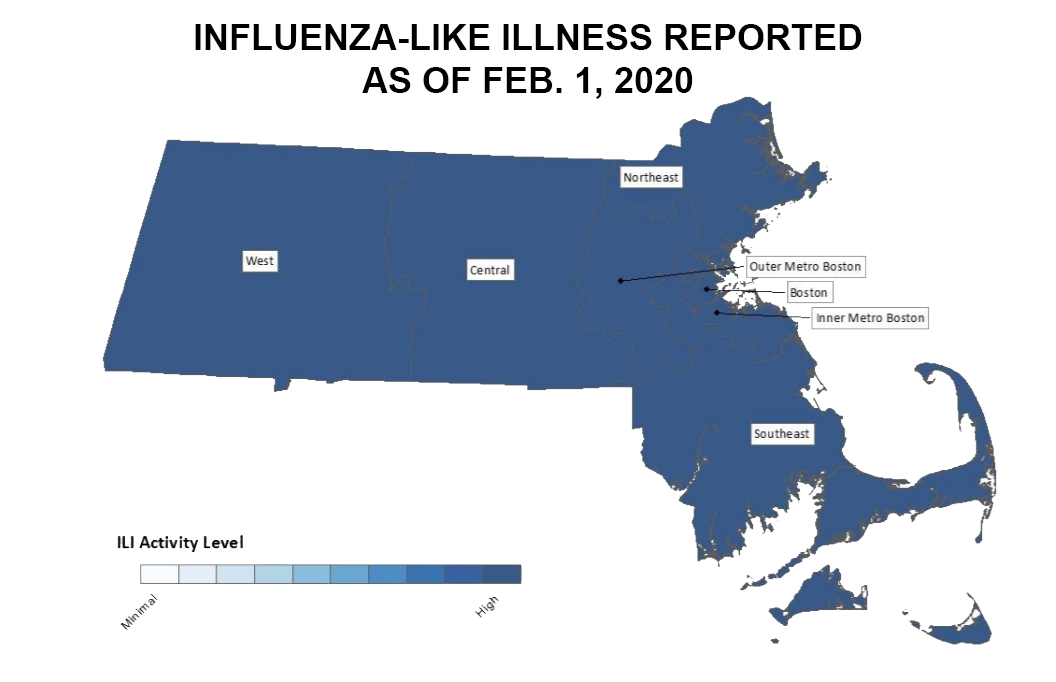Seasonal Flu
NEW for 2020-2021: The Massachusetts Department of Public Health has announced that all full-time undergraduate and graduate students attending any college or university in-person within the Commonwealth are required to get an influenza vaccination.
**NEW for 2020-2021: The Massachusetts Department of Public Health has announced that all full-time undergraduate and graduate students attending any college or university in-person within the Commonwealth are required to get an influenza vaccination.
As a result of this new policy, all in-person Stonehill students are required to receive the flu vaccine and provide documentation to Health Services, or must be approved for a medical or religious exemption to the influenza vaccine by December. Students currently remote but planning to return for the spring semester must get the flu vaccine or they will not be allowed on campus. Students who attend any classes or activities on campus during the spring semester, even once, must be vaccinated.
The state's new vaccine requirement is an important step to reduce flu-related illness and the overall impact of respiratory illness. It is especially important this year during the COVID-19 pandemic. Although not required, we also encourage remote-only students to be vaccinated, to protect their own health and the health of those around them.
Please submit documentation to Health Services using the online verification form.
What are effective ways to prevent getting the flu?
The best defense against seasonal flu is getting a Flu Vaccine every year by October! Other effective prevention actions are regular and thorough hand-washing, coughing into your elbow/shoulder rather than your hands, avoidance of touching your face, and avoiding contact with others who are sick.
What are the peak flu months?
Usually the peak months for Influenza activity in Massachusetts are January and February.
Who should be vaccinated?
Annual influenza vaccination is recommended for all persons age 6 months and older to decrease morbidity and mortality caused by influenza.
During the COVID-19 pandemic, reducing the overall burden of respiratory illnesses is important to protect vulnerable populations at risk for severe illness, the healthcare system, and other critical infrastructure.
- Different flu shots are approved for people of different ages. Individuals should get a vaccine that is appropriate for their age.
- There are inactivated influenza vaccines that are approved for people as young as 6 months of age and some vaccines are only approved for adults.
Who should not be vaccinated:
- Children younger than 6 months of age are too young to get a flu shot.
- People with severe, life-threatening allergies to flu vaccine or any ingredient in the vaccine. This might include gelatin or other ingredients.
If you have one of the following conditions, talk with your health care provider to decide whether vaccination is right for you, and select the best vaccine for your situation:
- If you have an allergy to eggs or any of the ingredients in the vaccine. Talk to your doctor about your allergy. See the CDC website for "Special Considerations Regarding Egg Allergy" for more information about egg allergies and flu vaccine.
- If you ever had Guillain-Barré Syndrome (a severe paralyzing illness, also called GBS). Some people with a history of GBS should not get a flu vaccine. Talk to your doctor about your GBS history.
- If you are not feeling well, talk to your healthcare provider about your symptoms.
How does the flu spread?
The flu spreads from person to person in respiratory droplets when people who are infected cough or sneeze. The person becomes infected through inhalation, or by touching something with the virus on it then touching their mouth, nose or eyes.
What You Can Do to Stay Healthy
- There are everyday actions people can take to stay healthy.
- Cover your nose and mouth with a tissue when you cough or sneeze. Throw the tissue in the trash after you use it, and wash your hands or use hand sanitizer immediately.
- Wash your hands often with soap and water, or use an alcohol-based hand sanitizer.
- Avoid touching your eyes, nose or mouth. Germs spread that way.
- Try to avoid close contact with sick people since influenza spreads from person-to-person through the coughing or sneezing of infected people.
- If you get sick, stay home from work or school and limit contact with others to keep from infecting them.
What To Do If You Feel Sick
If you are running a fever, have a cough and/or sore throat, go home and get better. If you are unable to go home, you should stay in your room until you no longer have a fever for more than 24 hours. If you have any questions or concerns, you may call Health Services for more information: 508.565.1307.
- Stay home.
- Drink plenty of fluids such as water, juice, chicken broth.
- Wash your hands, cover your cough and sanitize your living space if you share a room with someone.
- What to do if you have the flu
Resources
- Check out the Symptom Checker to see if you have the cold or the flu
- Center for Disease Control (CDC) Flu Website
- Information about the Avian Flu from the Mayo Clinic
- Read our Tips on Taking Care of YOU brochure for more information on how to get well soon.
Dear Stonehill Community,
This month, Stonehill has started to see more flu and flu-like illness on campus.
That mirrors the Massachusetts Department of Public Health's weekly report from last Friday, which reported that flu severity is HIGH in the state. In fact, they say the state is seeing more hospitalizations than in each of the last two years and the number of positive tests for flu is rising each week.
We want to make sure you know, it is NOT too late to get vaccinated.

The Flu Vaccine Works
For the 2019-2020 flu season, CDC recommends everyone 6 months and older should get a flu shot.
The Center for Disease Control (CDC) estimates that during the 2017-2018 flu season, flu vaccine prevented approximately:
- 6.2 million flu illnesses
- 3.2 million flu-related medical visits
- 91,000 flu-associated hospitalizations.
- 5,700 flu-associated deaths
The Flu Is Here, But It's Not Too Late
The CDC says vaccination, into February and beyond, can still provide significant protection against the flu. The flu vaccine takes about two weeks to provide immunity, so do not wait any longer!

Flu Vaccine Cannot Give You The Flu
According to the CDC, the vaccine in flu shots is currently made in two ways, neither of which can give you the flu:
• a) with flu viruses that have been killed and as a result, are not infectious; or
• b) using only a single gene from a flu virus (as opposed to the full virus) in order to produce an immune response without causing an actual flu infection.
Flu shots are available, with proof of insurance, at your healthcare provider as well as at many nearby pharmacies. Use the CDC's HealthMap Vaccine Finder to find the nearest location where you and your family can get vaccinated.
We'd also like to acknowledge so many of you who were already vaccinated at one of the four flu clinics we had on campus last semester! The more people on campus who are vaccinated, the more protected our community is.
For more health-related information, please review the CDC website, our Health Services website, or give us a call at (508) 565-1307.
Thank you,
Maria Sullivan, M.M.Sc., PA-C
Director of Health Services
Flu Risk at Stonehill
When flu is in the community, as it is here at Stonehill, everyone is at risk for the flu. To protect yourself, please follow these prevention tips:
• Get a flu vaccine.
• Wash your hands regularly.
• Cover your mouth and nose when you sneeze or cough.
• Avoid touching your eyes, nose, and mouth.
• Keep work surfaces clean with a disinfectant.
• Do not share drinking bottles, lip products, or smoking products.
(Please consider quitting if you are a smoker!)
• Try to avoid close contact with sick people.
• While sick, limit contact with others to keep from infecting them.
For millions of people every season, the flu means the abrupt onset of fever, cough, sore throat, headache, muscle aches, fatigue, and miserable days spent in bed. Millions of people get sick, hundreds of thousands are hospitalized, and thousands to tens of thousands of people die from flu each year.
We don't want you to be one of those people.
THE FLU VACCINE WORKS
The Center for Disease Control (CDC) estimates that during the 2017-2018 flu season, flu vaccine prevented approximately:
6.2 million flu illnesses
3.2 million flu-related medical visits
91,000 flu-associated hospitalizations.
5,700 flu-associated deaths
This National Influenza Vaccination Week, we wanted to remind you to get a flu shot if you haven't already. It is the first and most important step in protecting against influenza and its potentially serious complications.
FLU VACCINE CANNOT GIVE YOU THE FLU
According to the CDC, the vaccine in flu shots is currently made in two ways, neither of which can give you the flu:
a) with flu viruses that have been killed and as a result, are not infectious; or
b) using only a single gene from a flu virus (as opposed to the full virus) in order to produce an immune response without causing an actual flu infection.
Flu shots are available, with proof of insurance, at your healthcare provider as well as at many nearby pharmacies. Use the CDC's HealthMap Vaccine Finder to find the nearest location where you and your family can get vaccinated.
We'd also like to acknowledge so many of you who were already vaccinated at one of the four flu clinics we've had on campus over the course of the semester! The more people on campus who are vaccinated, the more protected our community is.
We are in the process of converting older materials on this page to ensure accessibility. If you are unable to access a document during this process, please contact this page’s web content manager by email at msullivan7@stonehill.edu and they will assist you.